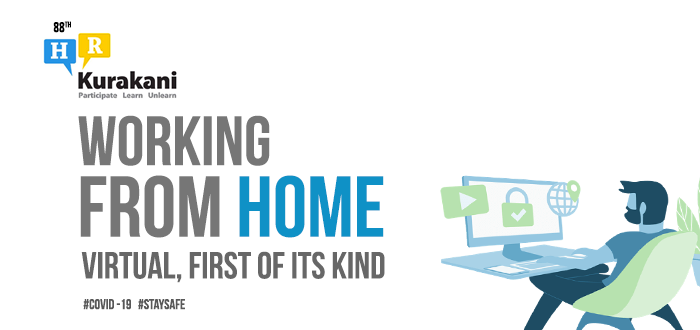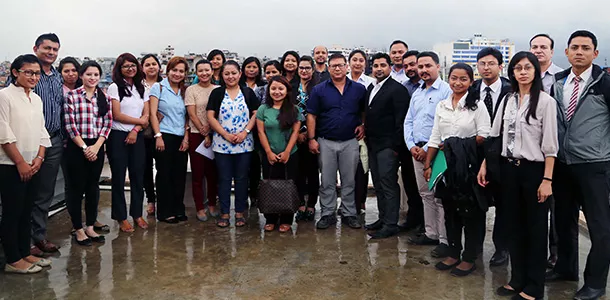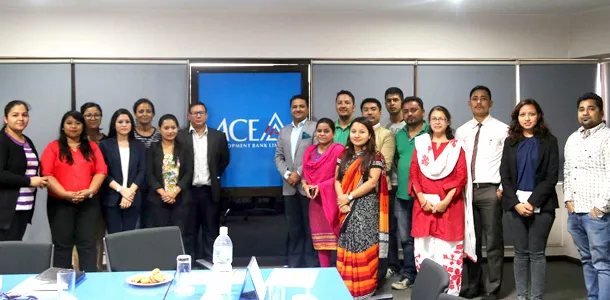
88th HR Kurakani interacts on Working from Home
Category: HR Kurakani | Date: April 1, 2020, 1:20 a.m. | Total Views: 2321
HR Kurakani, an open platform organized since past 8 years by Real Solutions successfully completed its 88th editions focused on the topic "Working from Home” on March 27, 2020. The first of its kind Virtual HR Kurakani was attended by numerous HR professionals from various organizations in Nepal and was moderated by Ms. Nibha Shakya, HR Manager of Real Solutions Pvt. Ltd.
As the Coronavirus outbreak grows, implementing work from home is becoming increasingly unavoidable for many companies. With more than 860,927 infected with the virus worldwide, companies are closing their doors to minimize the spread. Following the lockdown from Monday (i.e. 23rd March, 2020) many organizations in Nepal are allowing and some considering – work from home for their employees.
For some organizations, most notably IT Companies, developers etc., working from home might be something with which they may already be familiar to. How sensible the concept for remote working is for organizations remains an open question as for many other organizations, it will be their first experience of remote working.
Understating the complications of implementing Remote working in Nepal, the 88th Kurakani was centered on sharing, learning and discussing the experiences, challenges, success stories and best practices different organizations have adopted to make Work from Home more effective.
Working from home is not a panacea, there are plenty that both employers and employees can do to make this period of working from home more effective and productive. Addressing the current situation of self-quarantine and social distancing, the practitioners shared the best practice to prepare an organization for remote working can be: enhancing knowledge and awareness among the employees regarding the pandemic, strengthening health and hygiene infrastructure, assisting the risk and developing situation specific SOPs and communicating and bounding among the employees.
The most important practices for the organizations who haven't implemented remotely working till date is to experiment with different approaches, proper planning, drafting the SOPs and guidelines, properly communicating and adjusting as needed. Even after the implementation of WFH the organizations should structure a mechanism for the employees to share what’s working, what’s not working and what needs changes.
“We started planning and experimenting for work from home 2 weeks back before the deceleration of lockdown by the government. The testing phase of the work from home was a success as we were using a software that allowed us to monitor and keep track of the tasks, attendance and activities of the employees. Even after we’ve started remote working the system has helped us tremendously in streamlining the day to day activities of the team members and monitoring / evaluating the performance of an individual. “, said one of the practitioners. Intact communication and coordination between the line managers and the employees and remote working policies are the crucial part to make remote working a success, he added.
While there are many advantages of remote working, employers should be aware of the associated challenges. From OHS risks to data protection, IT and Communication, there are many challenges employers need to be able to address in order to have a safe remote working environment. " We can eliminate the risk of data security by having the employees sign an NDA that says they understand the aspects of their employment and do not share data secrets.", a practitioner added.
Some of the other major challenges as discussed during the Kurakani:
- it is difficult to implement work from home for all the employees with different job roles when it mainly comes to some of the manufacturing and service provider companies.
- Availability of resources required to implement remote working such as laptops, internet etc on the employees’ side.
- While working from home maintaining a good work life balance can be a challenging task for the employees which may impact their work efficiency.
“As more and more companies are implementing Work from Home, trusting own employees become increasingly important for managers to understand, embody, and ultimately spread across their workforce.”, said one of the practitioners.
The majors taken to restrict the spreading of coronavirus, have a huge impact on the Nepalese economy and will no doubt also effect many businesses and the employees.
Planning for long-term response (COVID-19)
Moving forward with the Kurakani, the practitioners discussed about the possible majors to adopt if this situation gets worse, requiring employees to stay at home for a sustainable period of time. The Kurakani included discussion on looking at specific groups of employees, areas of the business and perhaps changing business practices.
In the discussion, it was agreed upon that the business productivity and profit will be an issue for many employers during this period; larger businesses might have the infrastructure and funds to cope with long-term remote working but smaller businesses may not be able to pay staffs if there is reduced productivity and sales. In this situation it may be necessary to consider alternatives such as short term working or lay-offs.
Provision for Retrenchment and reemployment as per Nepal. Labour Act are outlined below:
- If it becomes necessary to curtail production or services of an establishment, or to close down the entire establishment or a part thereof for more than three months because of exceptional circumstances, the general manager may lay off all or part of its employees after obtaining the permission of Nepal Government through the Labour Department.
- When laying off its workers or employees under subsection (1), those appointed last among workers or employees performing similar work who have completed one year of interrupted service shall be laid off first. Provided that if it becomes necessary to lay off those who have been appointed first instead of those who have been appointed last according to the prescribed order, this may be done after reasons have been given.
- The following procedure shall be observed when laying off workers or employees under subsection:
- one month's advance notice indicating the reasons for lay off, or one month's remuneration in lieu of such notice, shall be given to permanent workers or employees, or workers or employees who have completed one year of uninterrupted service.
- Lumpsum compensation at the rate of 30 days' salary for every year of service completed in the establishment shall be paid to the worker or employee concerned.
After remarks sharing form the HR professionals from diverse organization, the 88th HR Kurakani-Virtual, first of its kind HR Kurakani session officially ended with a vote of thanks. The knowledge, views and experiences shared during the session were very insightful.
(HR Kurakani is a no cost knowledge sharing event organized by Real Solutions to exchange ideas, opportunities and challenges among HR Professionals and Enthusiasts.)



